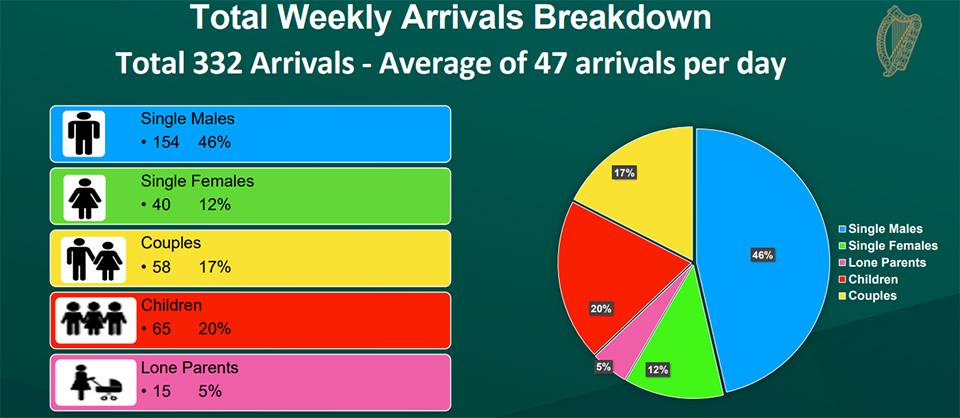As the numbers of people arriving into the state claiming to be seeking asylum from the war in Ukraine mounts, and An Taoiseach openly admits that there is a limit to Ireland’s capacity, surely it is time that the Irish state used the exemption available to it in order to impose that limit?
Arrivals of Ukrainians in the country have reportedly increased to a weekly average of 800, supplemented by climbing rates of arrivals from other countries which rose to 332 last week according to IPAS.
It is apparent that housing provision both by the state and the private sector, along with other services, are finding it increasingly difficult if not impossible to cope.
The relevant EU Directive, as Gript has several times referred to, is 2001/55/EC which sets out the criteria for “giving temporary protection in the event of a mass influx of displaced persons and on measures promoting a balance of efforts between Member States in receiving such persons and bearing the consequences thereof.”
As we have repeatedly pointed out: the EU Directive on Temporary Protection allows the state to impose a limit due to capacity. The Irish government chose to ignore that – and insisted that our international obligations meant no limit could apply.
As we said previously, the Directive is not, as sections of the Irish establishment have claimed and as Minister Roderic O’Groman appears to believe, a charter for taking in unlimited numbers without any questions being asked of them, and without any conditions being imposed.
It is especially not, or ought not to be, a license for persons who are travelling back and forth to the country they are fleeing, and who are clearly abusing the host state’s hospitality.

For the first time over the entire course of this crisis, An Taoiseach Leo Varadkar and the Finance Minister, Michael McGrath, are recognising that “there are constraints and limits to what we can do”, in McGrath’s words.
He also mentioned something that is generally only acknowledged as evidence of some sort of prejudice, which is that there is a need to take into account how the pressures on housing are impacting on the indigenous population.
In the Dáil yesterday, Aontú leader Peadar Tóibín asked An Taoiseach if “cracks are appearing” in the Government approach to the arrival of so many new applicants. He also claimed that current immigration policy is not “sustainable” and that the Government itself has recognised that there is a “pull effect.”
This, as Gript and others have pointed out, is mostly a consequence of the vastly more generous social welfare and other provisions available to refugees arriving here from Ukraine, and other countries in which there is no war.
This is particularly the case where it is now accepted that large numbers of Ukrainian refugees are moving here, not directly from Ukraine, but from other EU states in which they have been granted Temporary Protection under the terms of Directive 2001/55/EC. The response of An Taoiseach to Deputy Tóibín would suggest that he is indeed thinking in terms of exactly what the state’s obligations are.
What is becoming increasingly apparent to everyone now, though, if it has not been the case for a long time, is that while there is no limit on the compassion of the Irish Government and people, there is a limit on our capacity. We are very much at this point now. We just do not know if we will be in a position to provide accommodation and all these additional supports for another 30,000 to 50,000 people if this number were to arrive over the next year. Based on current numbers, it would not be far off this figure. We just do not know if we will be able to provide that level of accommodation.
Compounding all of this is the once again steadily increasing numbers of people, most of whom we know are from countries where there is no war or crisis to justify their being granted asylum here, who are imposing further strains on a system that simply is unable to cope. The demands for accommodation from that cohort of 25,000 asylum claimants is separate from the almost 100,000 Ukrainians now in the country.

A microcosm of this is the impact which it is having on Donegal, which is currently experiencing its very own crisis as random and unannounced arrivals take up housing and impose further strains in local health and other provisions.
According to the latest figures from IPAS, there are 1,444 persons in IPAS accommodation in the county of Donegal.
Not only is that the fourth highest number within any local authority area, next to only the four Dublin council areas, but it is higher in per capita terms than Dublin as a whole and is the highest per capita rate in the state.
This, and all of the problems it causes for communities, including those in the Gaeltacht, are what ought to the priority for the people charged with administering the state, not the needs of mostly young men who are for the most part economic or welfare migrants and who are almost invariably adjudged to be such, when the state eventually gets around to processing them. After which most of them stay anyway.